Bark's Bites: The Day the Dealers Died

Over the years, every single time I’ve written about dealers and questionable business practices, the feedback from readers is invariably the same — kill the dealer model. Nuke it from orbit. We would all rather deal directly with the manufacturer than some slimeball franchisee. We want to order cars exactly the way we want them, down to the color and trim, and we want them delivered directly to us without the hassle of spending the day at the dealer saying “NO” to Tru-Coat.
Well, I should clarify — not all readers feel this way. Any reader who works for (or has previously worked for) a dealer will tell us all that we need the protection from OEMs that franchise agreements provide the customer. They tell us that competition in the marketplace is good for the consumer, and that it helps the local economy to have franchises around America.
But what would really happen if OEMs got their way and were able to sell directly to the consumer? What if all the dealers disappeared tomorrow? Would you be happy with the result? Or would it damage the customer? Who would benefit, and who would suffer under such a model? Let’s look at it objectively.
Thanks to Henry Ford, the barn door on the franchise model is already open, and it has been for a hundred years. If OEMs had controlled their own distribution from the get-go, we’d be having a very different discussion than we’re having right now. But they didn’t, and now we have Ford and Chevrolet stores in places like Silver Lake, Indiana, because a hundred years ago — hell, even twenty years ago — the infrastructure of the nation wasn’t designed to support people traveling a hundred miles to buy a car.
Of course, things have changed since then. If you want your first glimpse at what life would be like without dealers, we don’t have to go too far back into history to see how the OEMs would like to control their distribution. In 2009, after the government bailout of GM and Chrysler, the American giants took advantage of the opportunity to cut thousands of dealers across the country. Many of those dealers petitioned to keep their points open, and some even sued, but at the end of the day, about a third of GM dealers and about a quarter of Chrysler dealers got the ax. Yes, the struggling economy was given as the main reason, but OEMs were secretly thrilled to be able to consolidate their sales to a smaller number of dealers. They didn’t have to continue to support a sprawling network of dealers that sold 10-15 cars a month throughout flyover country.
If OEMs were able to cancel franchise agreements tomorrow, that consolidation would increase significantly. If we assume OEMs have little to no interest in selling early-model, off-brand, and non-certified used inventory, then they would need to have much more volume per rooftop to be profitable. If we get your dream world, where you can order your car online and have it delivered to your driveway, then that opportunity for retail volume shrinks even more. A market like Dallas/Fort Worth might currently have about 15 Chevrolet stores — under OEM ownership, that number would be cut in half, if not two-thirds. But that’s just the big markets. What about small markets?
You could guarantee the closure of every small town Ford, GM, and Fiat Chrysler store in America. OEMs have no interest in running a store that sells 20 new cars a month. And while the opportunity to order your own car online and have it delivered to your house sounds appealing, what happens when that new car breaks and it requires warranty service? Your average Chevrolet Sonic customer isn’t like your average Tesla Model X customer — he can’t afford to be without his car for more than a day or so, and he doesn’t likely have another option when it comes to transportation.
Would OEMs open up rural service centers, or authorize independent shops to perform recalls and warranty work? Possibly, but it’s unlikely. More likely, customers would have to find some way to get their broken cars 50 miles to the closest dealer, then figure out some other way to make it to work on those days they don’t have a car.
Ah, but at least you wouldn’t have to deal with negotiating all day at the dealer. That’s because there would be no more negotiation. For those of you who love the sound of that idea, well, you didn’t love it enough to keep Saturn or Scion in business. And while the marketplace has decided they like the idea of paying one price at CarMax, that’s largely due to the distrust of car dealers when it comes to used car pricing and quality. While people might say they like the idea of not negotiating on a new car, it will take a generation to break people of the desire to do it.
But, there is an undeniable truth in the car business — the customers who scrap for every dime on a deal are the least satisfied, and the customers who got bent over the deal desk are the happiest. If you knew that everybody who bought a BMW 340i paid exactly the same amount that you did, and neither a penny more or less, would that make you happier? It actually might.
And wouldn’t OEMs be able to charge less money for cars if they didn’t have to pay greedy franchisees to sell them? Well, maybe. They still have to deal with the same shrinking margins that the franchisees do, they still have to operate brick-and-mortar retail facilities, and they’d have their own direct digital sales model to compete with. So while you might see more sales or incentives, it’s doubtful that MSRPs would decrease much, if at all.
However, at least we’d all get what we want — the ability to spec out our car online and get exactly what we want. Or would we? I don’t think so. If anything, trim levels and color options could potentially decrease. Why? Keep this in mind — as it stands now, the real customer of the OEMs is not you, it’s the dealer. With many OEMs and with many dealers, whatever comes off the truck is what they get. In order to get some F150s, the dealer has got take some Fusions and Tauruses, too. Once the OEM can no longer offload whatever come off the line onto unwilling dealers, they’ll have to seriously streamline their production to make sure that every single car gets sold.
That could mean the elimination of not only low-volume colors and trims, but models, too. But wouldn’t they be able to make the cars as the orders come in, you might think? If that was your first thought, I encourage you to go dunk your head in a bucket of ice. Then, I encourage you to take a tour of the Honda Marysville plant or the Toyota Georgetown plant. These facilities are not designed for custom orders — they are designed to churn out 800 cars a day. Right now, they might be able to handle the very few custom orders they get. If the floodgates open to customer online ordering, they’re going to have to reduce those options significantly.
How about financing? I think you’d get reduced to two options — captive financing or bring your own. It seems unlikely that OEMs are going to want to lose any of that finance money to banks. Would that make them be more or less competitive? I’m honestly not sure. But what it would do would prevent you from getting bumped a few points on your loan by a sleazy finance and insurance manager. Overall, I think this is a win for customers — unless you’re subprime. OEMs aren’t likely to want to finance subprime buyers in house, so customers who might have been able to convince Wells Fargo to give them a 6.9 percent loan on a new Focus are probably going to be Kia shopping in this Brave New World.
So what’s the verdict? If OEMs had never established the dealer model, we might all be better off for it. But now that it exists, and the business has been designed to support it from top to bottom, I don’t think that we can roll it back into the ocean without some serious negative impact to the consumer base as a whole. Be careful what you wish for.

More by Mark "Bark M." Baruth
Latest Car Reviews
Read moreLatest Product Reviews
Read moreRecent Comments
- Jeff One less option will be available for an affordable midsize sedan. Not much can be done about GM discontinuing the Malibu. GM, Ford, and Stellantis have been discontinuing cars for the most part to focus on pickups, crossovers, and suvs. Many buyers that don't want trucks or truck like vehicles have moved onto Japanese and South Korean brands. Meanwhile large pickups and suvs continue to pile up on dealer lots with some dealers still adding market adjustments to the stickers. Even Toyota dealers have growing inventories of Tundras and Tacomas.
- Lorenzo This car would have sold better if there was a kit to put fiberglass toast slices on the roof.
- Lorenzo The Malibu is close to what the 1955 Bel Air was, but 6 inches shorter in height, and 3 inches shorter in wheelbase, the former making it much more difficult to get into or out of. Grandma has to sit in front (groan) and she'll still have trouble getting in and out.The '55s had long options lists, but didn't include a 91 cubic inch four with a turbo, or a continuously variable transmission. Metal and decent fabric were replaced by cheap plastic too. The 1955 price was $1765 base, or $20,600 adjusted for inflation, but could be optioned up to $3,000 +/-, or $36,000, so in the same ballpark.The fuel economy, handling, and reliability are improved, but that's about it. Other than the fact that it means one fewer sedan available, there's no reason to be sorry it's being discontinued. Put the 1955 body on it and it'll sell like hotcakes, though.
- Calrson Fan We are already seeing multiple manufacturers steering away from EVs to Hybrids & PHEVs. Suspect the market will follow. Battery tech isn't anywhere close to where it needs to be for EV's to replace ICE's. Neither is the electrical grid or charging infrastructure. PHEV's still have the drawback that if you can't charge at home your not a potential customer. I've heard stories of people with Volts that never charge them but that's a unique kind of stupidity. If you can't or don't want to charge your PHEV then just get a hybrid.
- AZFelix The last time I missed the Malibu was when one swerved into my lane and I had to brake hard to avoid a collision. 1 out of 5⭐️. Do not recommend.





















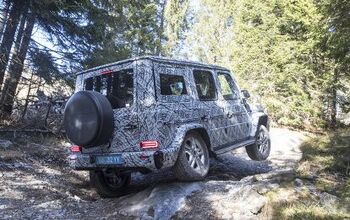
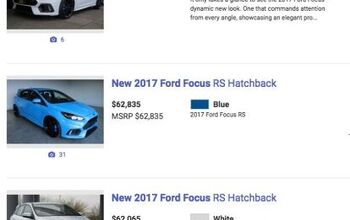
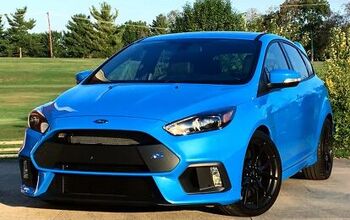
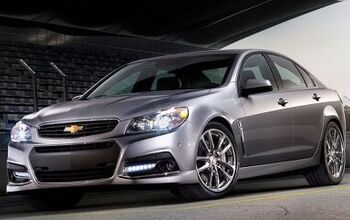
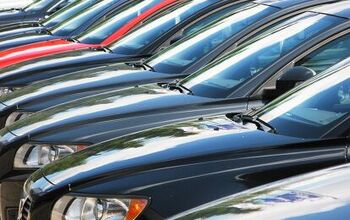










Comments
Join the conversation
Look at the UK market for a horrifying glimpse of the future. Niche models - gone. Sedans - gone. Want a standard spec CUV? That's all you have.
1) OEM run dealers/service centers isn't the promised land. 2) People who like to spout off about business models on the internet have rarely run a business. 3) Whoever owns it, running a dealerships costs money for the land, building, utilities, insurance, staff, etc. "Eliminating the middle man" doesn't necessarily mean lower consumer prices. 4) It takes a lot of capital investment to provide up to date dealerships and service centers. Do the OEMs really want to have another need for capital? 5) Right now dealers carry the financing costs of holding inventory waiting for the buyer. 6) Build-to-order is real life is as popular as manual transmissions. 7) Tesla continues to loose money at a rapid clip. "Yeah, but Tesla does it" isn't a sound business argument.